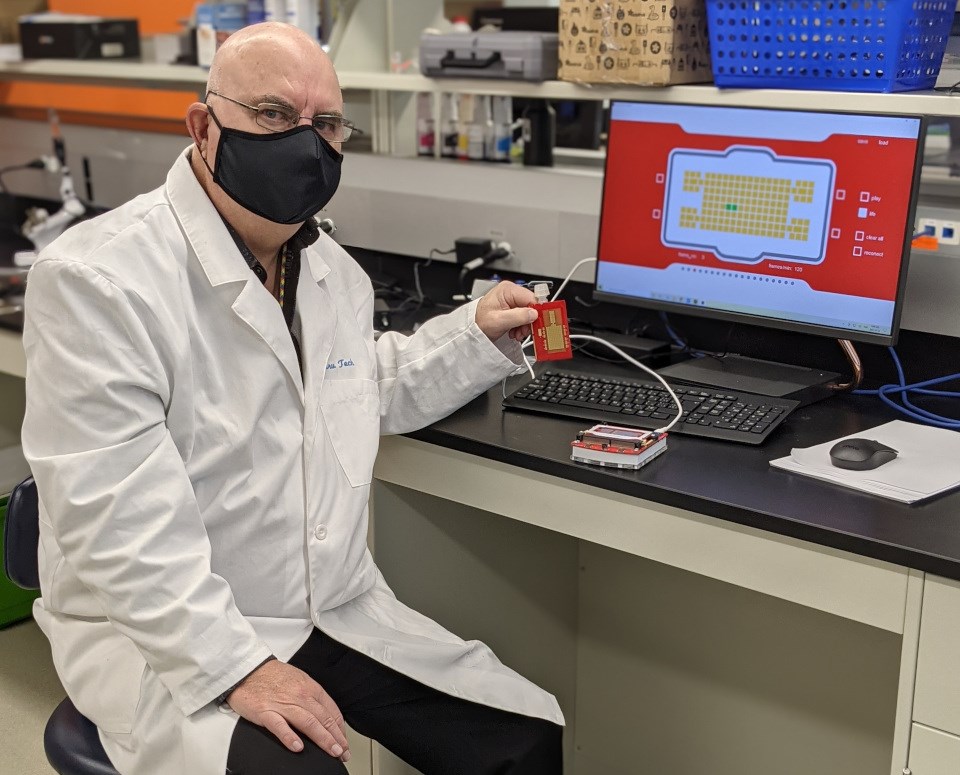Ten years ago, Jeff Sutton was sitting with his father over lunch when inspiration struck.
His dad, who was living with diabetes, had just pricked his finger to get a drop of blood so he could check his blood glucose levels before eating.
“I’m sitting here, thinking, he can do a blood glucose test and make an interpretation of it, and I can’t check my own cholesterol without going to a doctor and getting a prescription,” Sutton said. “How does that make sense?”
In the decade since, Sutton and his company, Verv Technologies, have been working to refine a process that would allow people to perform simple blood tests in their homes. Now, commercialization may be as near as 2022.
Using a finger prick of blood, Verv’s technology separates the plasma from whole blood, conducts an analysis, and delivers the results to your smartphone just 15 minutes later.
The startup's target market is health-conscious consumers who trend toward preventive health measures – the same demographic that uses Fitbits and other electronic devices to track indicators like heart rate, exercise, weight, steps, and more.
“The old paradigm is: you wait until you’re sick and then you go to a doctor,” Sutton said. “With the new paradigm, the ‘Fitbit’ generation, it’s: monitor your health while you’re healthy, and make sure you’re doing things to remain healthy.”
To conduct a test, a user places a drop of blood onto a disposable test strip, which is then inserted into Verv’s analyzing device, called Vi.
The user then runs the Verv app through their smartphone, which activates the device to perform the analysis.
Users can test for anything from vitamin D to glucose to cholesterol to C-reactive proteins, all of which are considered ‘CLIA waived tests.’
In the U.S., lab tests are regulated under the Clinical Laboratory Improvement Amendments of 1988 (CLIA). Tests waived by CLIA are those the organization has cleared for use at home.
“They’re a fairly simple test, so the likelihood of being accurate is good, and if they’re wrong, if it’s an invalid result, the likelihood of doing harm is low,” Sutton said.
For example, a test showing that you have high cholesterol won’t warrant a trip to the emergency room, he noted.
Want to read more stories about business in the North? Subscribe to our newsletter.
Key to making all this work is the ability to separate plasma using just a drop of blood.
In a lab setting, a phlebotomist will typically draw a vial of blood and use a centrifuge to spin it rapidly, which separates the plasma for testing.
But doing that with a smaller sample is a much trickier task, and for years that proved the sticking point for Sutton and his team. Then, a little over a year ago, Verv had a breakthrough.
“We invented a really out-of-the-box way to separate plasma out of whole blood,” Sutton said. “We’re now in the middle of developing an analyzer, which we expect out in June.”
While advancing development on both the device and the smartphone app, Verv is simultaneously pursuing approvals from both Health Canada and the U.S. Food and Drug Administration, a process he expects to get underway shortly.
Proving the efficacy of a medical device that uses novel processes or technology usually takes several years and lots of money, Sutton noted.
But because Verv’s system employs methods that have already been approved, he’s confident the approval process will be much faster.
Details on manufacturing still have to be worked out, but Sutton said that once Verv goes into production, assembly of the devices will take place at their lab space at the Health Sciences North Research Institute in Sudbury’s South End.
He added one additional person to his team this January and expects to hire another few later this year. By the time the company reaches the assembly stage, he anticipates his workforce being up to 20.
Since its breakthrough in finding a way to separate plasma from whole blood, Sutton said, Verv’s work has garnered attention from international quarters.
His team is now collaborating with GaudiLabs out of Switzerland, along with researchers at the University of Toronto and Ryerson University, in moving the technology forward.
“In most cases, they came to us; we didn’t go search them out,” he said. “I’m so lucky. We’ve got world experts in these things working with us on this.”
At home, the technology has gained believers in the Northern Ontario Heritage Fund, and NORCAT, the latter of which was “the most incredible, useful tool” in providing entrepreneurship support and networking opportunities, Sutton said.
The company was also awarded $250,000 in seed capital from the Sudbury Catalyst Fund last November.
Verv’s supporters see myriad applications for the device, with much of the ongoing interest sparked by the onset of the COVID-19 pandemic last year.
Vi could be used by residents in rural or remote communities that don’t have immediate access to a physician. Patients with chronic illnesses could run routine tests at home rather than sitting in a waiting room, potentially being exposed to further illness. In places like the U.S., where people have little or no health insurance, an at-home testing device could be a more affordable option to frequent lab visits.
The possibilities for the data are “enormous,” Sutton said.
“The current thing right now is you’re in control of your own data and you decide what to do with it,” he said.
“This will revolutionize biochemistry testing and finally bring the last thing home to the Fitbit generation.”




